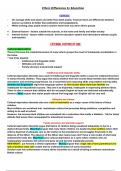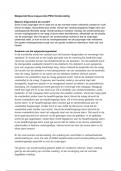Summary
Summary AQA Sociology Ethnic Differences In Education
- Institution
- AQA
It examines both external factors, such as cultural deprivation, material deprivation, and racism in wider society, and internal school factors like labelling, teacher expectations, and institutional racism. Key sociological studies from researchers such as Gillborn and Mirza are included to ex...
[Show more]




